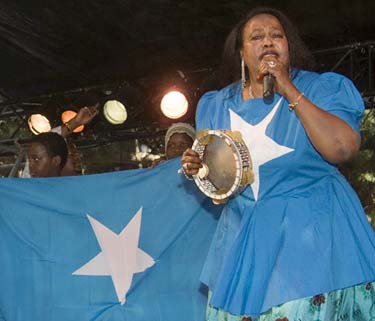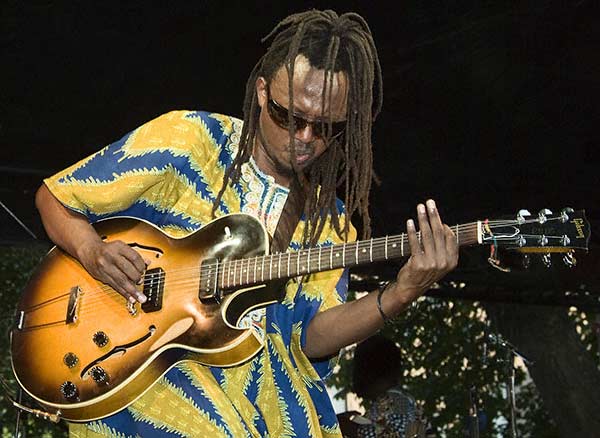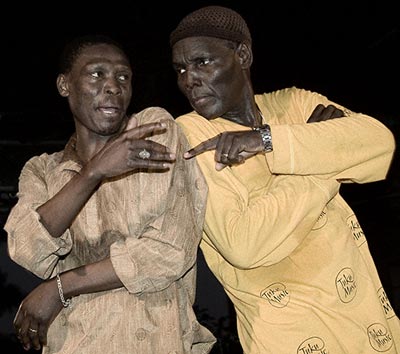|
|
|
The 17th Annual Afrofest — Day 2
Presented by Music Africa
|
| July 10, 2005 • Queen's Park • Toronto |
|
| Report by Joyce Corbett with photos by Roger Humbert |
| Faduma Ali Nkrumah considers her music to be a mixture of Soul and African Jazz with some Blues influence. She was a member of a group called Somali Jazz who toured widely in Africa, Europe, the Middle East and China. The group broke up in the 1990s because of the civil war in Somalia. Since her arrival in Canada in 1991, Faduma has organized many concerts to promote Somali culture and customs. She has also appeared in two Somali movies filmed in Toronto and written two film scripts, one about the experience of Somali immigrants trying to make a home in Canada and one about the misconceptions surrounding HIV and AIDS and their impact on the Somali community. |
|

Faduma Ali Nkrumah |
|
| Faduma takes the stage to a chorus of cheers, wearing a top patterned after the Somali flag — blue with a white star. “Nice to meet you”, she says simply and warmly. She has three female singers with her and an oud player. He starts one piece with some deeply resonating, deeply blue playing and I am stunned by how beautiful it sounds. I don’t hear much jazz in the mix but I do hear a heavy Arabic flavour. When Faduma launches into some rapid rhythmic vocals, a circle forms in the audience and the dust rises as the dancers’ feet beat the dry ground. Her last song has all the Somalis singing along.
Le Groupe des Arts Bassan, originally from Ivory Coast, hit the stage next and blow us away. From the sexy “Shake what your mother gave you” to break-dance moves and a Michael Jackson moment, all eyes are glued on these marvellous performers. So much energy and so much joy. If you’ve never seen them, or you just want to see them again, they will be performing at the 2005 Toronto Harbourfront Centre’s Kick Up Your Heels! celebration of dance later this summer (Aug. 26 – 28). They will also be teaching a workshop in dance styles from Ivory Coast.
The Mighty Popo has his own rich multifaceted sound as a guitar player, vocalist and songwriter. He has absorbed the different styles of music around him so deeply that they emerge naturally in his own. After a while, your ears are ready for anything – Rwandan–flavoured blues, South African harmonies, soukous, jazz, reggae, New Orleans shuffle, jazz, it’s all part of Popo’s musical creole. A piece may flawlessly integrate varied elements into a new and unique sound or it may fit easily into a specific genre. His music is Central African at the core but his creativity pays no mind to borders. And as you listen to Petr Cancura’s inspired jazz saxophone solo over the steady heartbeat of an African rhythm, you can hear that the rest of the band share his sensibility. With members from Ghana, Canada, Burundi, The Czech Republic and Senegal even the composition of the band reflects the varied sources of his music.
|

The Mighty Popo |
| The Mighty Popo places great importance on social commitment and on his responsibility as a performer and a musician to advocate for social change. He tells the crowd, I have just played at Live 8 in Barrie (at which everyone cheers). He makes it clear that he thinks it was a wonderful initiative to support the people of Africa but he also touches on the question of how much awareness of the issues it really raised. He tells us, we are going to have our own Live 8, right here, today. He urges, Africans stand up for Africa! write your MPs! make your views known. He tells the crowd, all human beings have the right to a decent life and to freedom, do something to make that happen. Several of us watch an escaped balloon floating up into the sky.
Next up, all the way from Zimbabwe, is Oliver “Tuku” Mtukudzi & Black Spirits (Never Mpofu, bass; Clive Mukundi, lead guitar; Erick Kasamba, vocals and percussion; Mary Bell & Peggy, vocals; Clive Mutysira, drums; Jairos Hambahamba, keyboards and Kennedy Neshamba on percussion). Also a believer in social commitment, he takes a different tack. In contrast to Popo’s youthful fervour and socio-political criticism, Oliver plays the role of the wise uncle or village elder who offers careful advice. He avoids the political, because, as he says, politics creates sides and divides families. He tells us his father wanted him to be a mechanic or an engineer and sings a song to parents about helping their children find their own path. He sings a song about the peril of AIDS. As a prelude to a surprisingly upbeat tune, given the opening lines “Hear me Lord, help me now I’m feeling low” he talks about how music was everywhere as he was growing up. Like food, he says, it is a basic necessity and has many uses, perhaps the most important of which is to defuse tension. Certainly, the stresses of everyday life seem far away as the joyous crowd dances to his infectious rhythms.
|
| His music incorporates many traditional African and pop influences. There are the hypnotic rhythms of chimurenga (inspired by the thumb piano), some energetic Zimbabewan pop, traditional drumming and South African stylings. Outstanding are the beautiful vocal harmonies and the guitar work. The first tune they play astonishes me as I hear something I never expected, an almost country guitar sound. Bill Frisell’s name pops into my head.
As we walk out of the park a woman asks the tired but happy girl stretching out playfully in her arms, “Did you like Uncle Oliver?”. Yes, she nods, smiling.
|
|

Erick Kasamba & Oliver “Tuku” Mtukudzi |
|
|
|
|
|
> The Mighty Popo |
|
|
|
|
|




